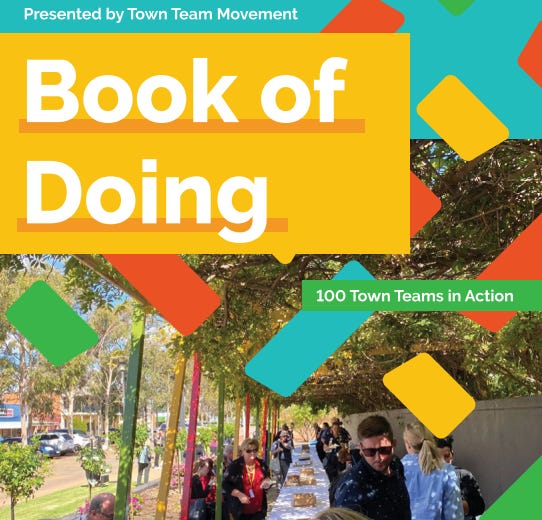Places Briefing #3
Events and reports on Greening cities, EU Cities Forum, re-visioning streets, getting local projects done, knowledge cities
Welcome to Places Briefing #3. Places Briefing is intended to sit alongside the longer posts in Policies for Places and brings shorter notices of recent reports and publications relating to important issues for the development of better places. This edition also includes some links to some forthcoming events which might be a interest to those with an interest in city futures.
Greening cities
My most recent post on Policies for Places explored the use of the 3-30-300 principle in planning urban green space. To complement that piece, here is the new handbook on the principle from Tradkontoret who have coordinated the Living Nordic City initiative for the Nordic Council of Ministers.
The value of Nature-based solutions
This up-coming webinar by FAO Green Cities Initiative looks interesting. Offers guidance on building a business case for green initiatives.
The Cities Forum 2025
Cities Forum 2025 this year takes place in Krakow, Poland, and the preliminary agenda has recently been announced.
The Cities Forum is a biennial major event of the European Commission, on the urban dimension of the EU Cohesion Policy.
The 2025 forum focuses on collecting ideas for the development of the EU policy agenda for cities and the future of European sustainable urban development.
Cities are seen as engines of growth, innovation, and sustainability in Europe. The event is intended to foster collaboration among urban stakeholders including local and regional authorities, policymakers, and urban practitioners, who will engage in discussions on some of the most pressing topics facing cities today, including housing, digital transformation, inclusive growth, and urban mobility.
For more details of the event are here.
Re-visioning streets
Last month the Chicago Departments of Planning and Development (DPD) and Transportation (CDOT) released A Vision for LaSalle Street, a framework for public realm improvements and neighborhood-oriented enhancements between Wacker Drive and Jackson Boulevard, informed by hundreds of community members through in-person and online meetings, an electronic survey and outreach through the city ward offices.
According to the report, the vision is built around 11 planning principles, which include:
Promoting a mix of private uses that encourage vibrancy outside of traditional 9-to-5 business hours, such as new restaurants and stores.
“Softening” the street’s canyon-like environment with new landscaping and greenery.
Making art, architecture and performance spaces foundational parts of the corridor’s identity.
Creating welcoming, pedestrian-oriented community gathering spaces and convenient public transit connections.
Prioritizing diverse, affordable programming that makes LaSalle an equitable and accessible destination for visitors and Chicagoans citywide.
An inspiring read. Now for the hard bit in making it happen!
Knowledge-based city development
This fascinating report examines the relationship between knowledge production and urban renewal. It explores how universities and cities can fruitfully engage to stimulate regeneration, attract investment, and strengthen communities. It is a comparative study of 3 major UK cities and draws lessons from the contrasting pattern of relationships between the knowledge institutions and each city, which are relevant for cities worldwide as they develop their relationships with universities and colleges in their areas.
Briefly, the report highlights how
- London's 40+ higher education institutions make it a global knowledge hub, yet the city's scale can overwhelm individual university identities;
- Cambridge shows strong university-city identification but faces tensions between institutional ambitions and community needs;
- Manchester demonstrates successful strategic alignment between universities and city development, supporting innovation while maintaining distinct urban identity.
The report is an accessible addition to the growing literature on university engagement with their host communities, and its findings should be valuable for urban planners, universities, and city officials working to create more inclusive, resilient, and sustainable urban environments.
More details of the report can be found here.
Delivering local projects
Here is an interesting collection of projects from the Town Team Movement, groups of local people wishing ‘to get things done’ in their local communities.. The movement started in Australia but now has more than 100 active groups in cities in many countries.
Read it here.
I hope you found this collection useful. If there are other topics you would like me to pick up please let me know.









